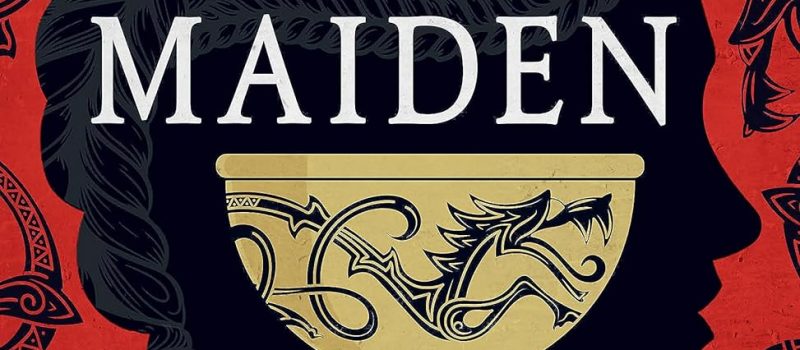Liz Bourke Reviews Shield Maiden by Sharon Emmerichs
 Shield Maiden, Sharon Emmerichs (Head of Zeus 978-1804545553, £20.00, 416pp, hc) February 2023. (Redhook 978-0-316-56691-1, $18.99, 416pp, tp) October 2023.
Shield Maiden, Sharon Emmerichs (Head of Zeus 978-1804545553, £20.00, 416pp, hc) February 2023. (Redhook 978-0-316-56691-1, $18.99, 416pp, tp) October 2023.
Sharon Emmerichs is a lecturer in early modern and medieval literature at the University of Alaska in Anchorage. Shield Maiden is the first novel she’s published under her own name, though she has an interesting array of academic publications to her credit, and her academic biography states that other novels have previously appeared under a pseudonym.
Shield Maiden is a semihistorical YA fantasy novel with romance at its centre. Inspired in some degree by that most famous Anglo-Saxon poetic epic Beowulf (set in the sixth century CE, per mentions of arguably dated individuals, though the earliest manuscript version dates from the late 10th or early 11th century), its climactic act is Beowulf’s battle with the dragon, though the focus and themes of the novel are very different to that of the epic poem.
Fryda is the daughter of Weohstan, sister of Wiglaf, and niece to King Beowulf, who has now ruled for 50 years. Her ambition since childhood has been to prove herself skilled at arms and join her father’s warriors as a shield maiden, but a localised earthquake dropped her into a ravine as a child, and from this accident she lost most of the use of her right hand. Now nearing 20 and neither married nor an acknowledged warrior, she continues to secretly train at arms while taking greater responsibility for the running of her father’s household. Her training partners are an older blacksmith, Bryce, and a debt-servant, Hild. The only other person aware of her hobby is the very handsome red-haired foreign slave Theow (whose name literally means slave). Hild and Theow have been Fryda’s closest friends since childhood.
Weohstan is hosting a celebration for King Beowulf, to which other important men have been invited, including Eadgils, King of Sweden. Eadgils resents Weohstan for, among other things, killing his brother many years ago. The grudge is not settled, though it may seem so to Weohstan. Meanwhile, Wiglaf – a young man very fond of alcohol and sex, and not at all fond of work – is realising that his inheritance of Weohstan’s holdings is not guaranteed. He’s also realising that Fryda is in love with the socially unsuitable Theow, a development which threatens his ego. Between Eadgils and Wiglaf, Weohstan’s holding – and Fryda’s life – is primed for violent disruption even before you take into account the fact that no one knows about the dragon sleeping nearby on a hoard of gold underground, primed to wake and spread destruction.
Shield Maiden is told from four perspectives. Well, three if you don’t count the interludes with the dragon, whose status and desires are rendered with rather less clarity than might be desired. Fryda, Theow, and Wiglaf. (The dragon is asleep, and also under a curse. The dragon wants to wake and destroy, but she also wants to die? The dragon is linked to the superhuman strength displayed by heroes like Beowulf, to which Fryda alone is also heir. The dragon can sometimes control whether Fryda can access this power, and sometimes not.) Wiglaf is an all-around unpleasant young man, selfish, conniving, cruel, and possessed of little personal bravery – though he manages to be superficially charming when he wants to be. Theow is a pleasant young man, close to the blacksmith, who mostly appears to work in the kitchens. He can’t remember his birthplace or his original people, but he dreams of being a free landholder and making a life with Fryda.
Meanwhile, Fryda… is perhaps the most difficult character of all for me to get a handle on. She wants to be a warrior (though not, it seems, to go to war) and is a person of egalitarian feelings when it comes to her friends, Hild and Theow. In a way, she seems like a classic video-game protagonist: there’s just enough there to give definition to an outline into which the player, or in this case, reader, can project themselves, and very little that would challenge the reader’s modern sensibilities or interfere with the consummation of a narrative of heroic wish-fulfilment – fulfilment for the character and for the reader. I don’t deride this choice: It’s a very effective and successful one when it comes to engaging readers, particularly ones who might find many aspects of medieval worldviews deeply alienating. But in combination with Emmerichs taking Beowulf out of legendary time (‘‘days long sped,’’ the mythic past of oral memory, with kings from the 500s CE) and setting Shield Maiden in historic time (994CE, which is just about the beginning of written history for the region that includes historic ‘‘Geatland,’’ where the novel is set) and playing fast and loose with history in the process, it feels like trying to have one’s cake and also eat it.
My suspension of disbelief broke on the labour of Fryda’s household centering on the kitchen. There’s not a spindle or a loom to be found, when the work of clothing a household took endless labour. This conspicuous absence is of a piece with Shield Maiden’s view of other early medieval realities: if they’re uncomfortable, like chattel- and debt-slavery, if they might disturb the reader’s sense of moral rightness, like the relations of power within the household of a great noble, which might give Fryda frankly frightening amounts of power over her two friends’ lives, or even if they might, like the traditionally women’s work of cloth production, interfere with the fantasy of heroic power through arms… well, then, best pass over it lightly. (It’s unfair to compare Shield Maiden to Nicola Griffith’s Hild: they’re doing different things, aimed at different audiences. Yet Shield Maiden recalls Hild to me just enough that it suffers in comparison.)
That’s not to say Shield Maiden isn’t enjoyable. Emmerichs’ prose is vivid, and her grasp of a fun action scene is adept. It’s easy to read. But I think I will also find it easy to forget.
Liz Bourke is a cranky queer person who reads books. She holds a Ph.D in Classics from Trinity College, Dublin. Her first book, Sleeping With Monsters, a collection of reviews and criticism, is out now from Aqueduct Press. Find her at her blog, her Patreon, or Twitter. She supports the work of the Irish Refugee Council and the Abortion Rights Campaign.
This review and more like it in the November 2023 issue of Locus.
 While you are here, please take a moment to support Locus with a one-time or recurring donation. We rely on reader donations to keep the magazine and site going, and would like to keep the site paywall free, but WE NEED YOUR FINANCIAL SUPPORT to continue quality coverage of the science fiction and fantasy field.
While you are here, please take a moment to support Locus with a one-time or recurring donation. We rely on reader donations to keep the magazine and site going, and would like to keep the site paywall free, but WE NEED YOUR FINANCIAL SUPPORT to continue quality coverage of the science fiction and fantasy field.
©Locus Magazine. Copyrighted material may not be republished without permission of LSFF.








